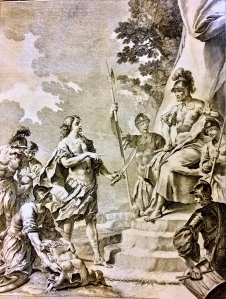One thing we must bear in mind when we talk about heroes of epic romance is that they are usually very young, by today’s standards. This applies mostly to women, as well as some men, particularly those who find themselves embroiled in love situations. In Gerusalemme Liberata, the greatest hero of them all is such a young man. He was not invented by Torquato Tasso; he first seems to appear in The Song of Roland, another ‘ancestor’ of Gerusalemme along with classical epic. But it was Tasso’s Rinaldo and his adventures that was destined to capture the imagination of audiences and inspire artists, most of all composers of opera, in the centuries to follow.

The arms of Rinaldo, torn and bloodied, are brought to Godfrey of Bouillon. Illustration by Giambatista Piazzetta. (Venice 1745). Sp Coll Hunterian Cd.2.1., Special Collections, University of Glasgow Library.
Rinaldo was only fifteen years old when he left his home in Italy to join the Frankish camp in the First Crusade. I’ve already mentioned the genealogy attached to Rinaldo, and what were Tasso’s reasons for it. Now, three years into the war, Rinaldo is only eighteen, an age in which most people today are considered little more than children. But he is already an accomplished warrior, and ready for love: his face is that of Cupid (Roman version of Eros, son of Venus, goddess of love). It’s easy to guess where Tasso will be going with this!
Rinaldo’s youth and pride in his martial prowess (Tasso likens him to Mars, the god of war, too) makes him too touchy and a tad too volatile. Basically he is the immature adolescent to be measured against Godfrey, the fully mature man. Incensed by a fellow soldier who doubts his honour, Rinaldo kills him, and when he is informed that Godfrey means to bring him to justice for this, he is outraged:
‘Let slaves defend their motives in a base
prison,’ he said, ‘or slavish creatures; I’ll
die – free-born, living freely – ere I’ll place
my hand or foot in gyves or shackles vile.
This hand well knows the sword’s use, and the use
of the victor’s palm. Fetters it shall refuse.
But if for my deserving Godfrey sends
such thanks, and wishes to imprison me
like a common criminal, if he intends
to drag me chained to a vulgar gaol, then see:
here stand I. Let him come or send his friends.
Our justicer the chance of war shall be.
A bloody tragedy he’ll thus ordain
the armies of the foe to entertain. (5.43-44)
Rinaldo’s aristocratic scorn for justice makes him less appealing to a modern audience; but he actually expresses the values of an older world order, in which war and combat were thought to be the only true means to judge highly-born men. Like Achilles in The Iliad, his anger has got the better of him, and his injured pride is more important than civil war and the slaughter of his comrades, which will make the Christian army the laughing stock of the foes. Like an extremely fractious teenager, Rinaldo doesn’t care.
Tancred, his champion and advisor, being older and wiser, advises Rinaldo to leave the camp, in order to avoid the bloody consequences of a refusal to obey Godfrey and to keep his honour intact at the same time. They’ll soon realise how important you are in this enterprise, he says, and will come begging. Rinaldo ‘consents at once to leave the camp behind,’ and refusing anybody’s company or assistance, he dons his beautiful armour, described in loving detail by Tasso, and he sets out on his own.
He leaves, and a great mind’s whip and spur, desire
for deathless, blessed fame within him grew.
His soul for generous enterprise on fire,
he is resolved unheard-of deeds to do. (5.52)
But will he succeed? Soon the Prince of Denmark will appear at the Christian camp, coming from afar, and bringing catastrophic news: he shows Godfrey a torn and bloodied armour, found at the site of a terrible battle, which everyone recognises with dismay: this is Rinaldo’s armour, and they last saw it on him when he left the camp …
(to be continued)

